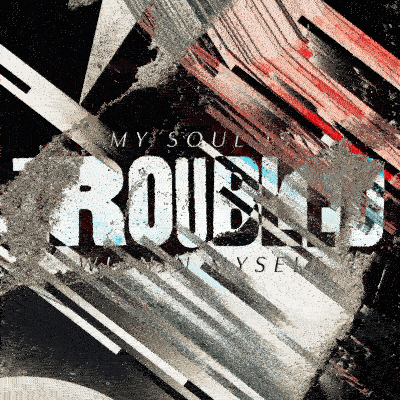And my God. My soul is troubled within myself: therefore will I remember thee from the land of Jordan and Hermoniim, from the little hill. (Psalm 41:7 DR)
The nature of this sojourning of ours is that we are constantly moved between extremes, between the consolations of hope and the gripping void of despair. The changeableness of our nature ensures that we have never fully arrived, and that in spite of an intellect and will set on one thing, we are never fully preserved from the discontents and dissatisfactions of this world. Even the very distractions that come our way seek to avert our gaze from what we desire in God, which can be truly disheartening, for our constancy can seem so fragile and our intention so fickle.
As the Psalmist concludes renewing his hope in the Lord and fixing his intellect and will upon the end, he comes immediately face to face with the inconstancy of this life and this world and even the affections of his own heart. One can almost hear frustration in his voice, for only a few words after the deepest expression of confidence he looks back into his own soul, as it were, and finds the trouble and disquietude that he thought he had overcome.
The fascinating aspect of this expression is that he almost seems to step outside of himself again, for he addresses his own soul as it is not the deepest part of him. He looks and sees that his soul is troubled “within myself,” which again is an interesting expression as the soul is generally what we think of as that which is truly “myself.” But this poetic bifurcation is meant to accentuate the tug-of-war within himself, for it is not really his soul—which hopes in God—which is troubled, but rather the condition of this mortal life. That is, as he pours out his soul he recognizes that the peace and singularity of desire that he longs for will not be found in this world or in this life. It as if he anticipates St. Paul’s words:
We see now through a glass in a dark manner; but then face to face. Now I know in part; but then I shall know even as I am known. (1 Corinthians 13:12 DR)
He knows in part not only in respect to God, but even in terms of himself. The disquietude of his soul is not a lack of hope, but rather the mortal condition:
My God, my soul is troubled by myself… He who was counselling his soul and rationally correcting his mind returns to the human condition and confesses, remarking that his soul is troubled by his own self. And that is true, for if the vices of the flesh failed to act in that way, the mind’s purity would continue in its tranquility. (Cassiodorus, Explanation of the Psalms, 41, 7, Ancient Christian Writers.)
There is a slight variant here in that the Old Latin and Vulgate have the phrase et Deus meus: (and my God), as following off of the previous passage; that is, the salvation of my countenance, and my God. This passage then begins Ad me ipsum anima mea contubata est: “My soul is troubled within (or by) myself.” However, St. Jerome’s Hebrew translation renders this slightly differently, bringing Deus meus into the beginning of this phrase: Deus meus in me ipso anima mea incurvatur: “My God, my soul is troubled by myself.” Incurvatur has the sense of troubled or disturbed, but in the idiomatical sense, as incurvatur means to be bent or bowed inward, like a bow that is being pulled back. It is this curving inward that accentuates the sense of confession that Cassiodorus draws out. The Psalmist begins by addressing God in confession, for he sees within himself the inconstancy of the flesh which still troubles the soul. And while the soul longs for the Lord as the hart for the water-brooks, yet there is still the “bent” of the flesh for the things of this world, and it is this conflict which invariably causes the disquietude.
St. Augustine (following a variant of the Old Latin) comes to a similar conclusion:
My soul is disquieted on account of myself. Is it disquieted on account of God? It is on my own account it is disquieted. By the Unchangeable it was revived; it is by the changeable it is disquieted. I know that the righteousness of God remains; whether my own will remain steadfast, I know not. For I am alarmed by the Apostle's saying, Let him that thinks he stands, take heed lest he fall. [1 Corinthians 10:12] Therefore since there is no soundness in me for myself, there is no hope either for me of myself. My soul is disquieted on account of myself. (St. Augustine, Expositions on the Psalms, 41, 12.)
The successful treatment of any disease requires an accurate diagnosis, and thus this disquietude need not be a source of further discouragement. Rather, the recognition of one’s own weakness and inability to find soundness within oneself is yet another means by which the soul is poured out so that it can look beyond itself. The inward curving of the soul towards itself must be straightened out, as it were, or—better yet—bent outwards so that the arrow of desire is directed towards eternal things:
Wouldest thou have it not disquieted ? Let it not rest on thine own self; and say, Unto Thee, O Lord, have I lift up my soul. Hear the meaning of this more plainly. Found not thy hopes on thyself; but on thy God. For if thou restest thy hopes on thyself, thy soul is disquieted on account of thyself; for it has not yet found any thing that should make it secure about thee. Since then my soul is disquieted on account of myself, what remains but humility? but that the soul should not presume on her own merits? What remains but that she should make herself the very meanest of all things, that she should humble herself, that she may deserve to be exalted; that she give herself credit for nothing, that what is good for her, may by Him be given to her. Therefore, because my soul is disquieted on account of myself, and since it is pride that causes this “disquiet.” (St. Augustine, Expositions on the Psalms, 41, 12.)
Humility is spoken of by St. Chrysostom as the “nurse of love” and the “root of every good,” and he relates that it is essential as the foundation upon which all piety rests:
The greatest of evils, and that which makes havoc of the whole world, is our entering into pride… Everyone that came after Adam wrecked himself in impiety, fancying some equality with God. This was the center of our evil, the root and fountain of all wickedness. God, preparing a remedy suitable to the disease, laid the Law first as a strong and safe foundation. This being fixed as a base, the Builder in security lays on it all the rest. But if this were to be taken away, though a man might reach to the Heavens in his course of life, it is all easily undermined, and comes to a grievous end. Though you practice fasting, prayer, almsgiving, temperance, any other good thing whatever, without humility everyone falls away and perishes. (St. John Chrysostom, Homily on the Gospel of Matthew, 15, 3.)
It is the recognition of his own limitations and lack of self-sufficiency that then causes the Psalmist to look beyond himself, to curve that inward bow outward, as it were. For after having perceived the inconstancy within himself, he immediately chooses to “remember” God. However, this recollection is not an abstraction, but is predicated in concrete realities; thus he says therefore will I remember thee from the land of Jordan and Hermoniim, from the little hill.
The Jordan river was one the boundaries of the Promised Land and was the initial entry point of God’s people into that land. The miraculous parting of these waters was a signification of the land begin given to them in fulfillment of God’s promise to Abraham. The Psalmist also prophetically looks forward to Christ’s baptism in the Jordan river by St. John the Baptist, which hallowed the waters of baptism. The hart of this Psalm thus longs for these waters, to cleanse the soul from sins and find its rest and peace in God:
From whence did I remember you? From the little hill, and from the land of Jordan. Perhaps from Baptism, where the remission of sins is given. For no one runs to the remission of sins, except he who is dissatisfied with himself; no one runs to the remission of sins, but he who confesses himself a sinner; no one confesses himself a sinner, except by humbling himself before God. (St. Augustine, Expositions on the Psalms, 41, 12.)
The theme of humility once again emerges, which is also accentuated by the terms Jordan and Hermoniim:
If you would also ask the meanings of the names, Jordan means their descent. Descend then, that you may be lifted up: be not lifted up, lest you be cast down. And the little hill of Hermon. Hermon means anathematizing. Anathematize yourself, by being displeased with yourself; for if you are pleased with yourself, God will be displeased with you. Because then God gives us all good things, because He Himself is good, not because we are worthy of it; because He is merciful, not because we have in anything deserved it; it is from the land of Jordan, and from Hermon, that I remember you. And because he so remembers with humility, he shall earn his exaltation to fruition, for he is not exalted in himself, who glories in the Lord. (St. Augustine, Expositions on the Psalms, 41, 12.)
St. Robert Bellarmine puts it perhaps more bluntly, seeing the Psalmist as taking his eyes off of himself:
I will take my eyes off myself, and fix them on you, instead of fixing my eyes on the Jordan before me; I will think of the river “that gladdens your city, and the torrent of thy pleasure,” [Psalm 35:9] enjoyed by those who are there with you; and from this little hill Hermoniim, before me, I will remember your holy mountain, in which you dwell with your holy Angels; and with such recollections I will console my soul and my desires. (St. Robert Bellarmine, A Commentary on the Book of the Psalms, 41, 6.)
Our Lord Jesus Christ did not need to be baptized, but in humility came to be baptized by St. John in the Jordan river, and in “descending” into the water so hallowed the waters of baptism. In imitation of His humility we also “descend” into the waters—both literally in body by the waters upon the head, and in soul by being buried with Him—and thus take our eyes off of ourselves, fixing them on the Jordan before us:
He also announces from where he will remember Him; it will be from the land of the Jordan, the place where the Lord earlier sanctified the blessings of baptism. The name of the river Jordan means “their descent,” for those who long to renew themselves with the gift of the sacrament descend into the depth of the waters. Even today we say of the baptized person, “He descends into the font.” Alternately this descent denotes the humility which the baptized person must have to follow the Lord’s precepts. So long as we are mindful of these things, we are not troubled by any disturbance through the ills that befall us. (Cassiodorus, Explanation of the Psalms, 41, 7, Ancient Christian Writers.)
For this animation I brought in some abstract textures and applied some pixel sorting to them, modifying the parameters so that it was more blocky than pixel-y. I then applied some wiggle hold to the position and rotation to give it a frenetic, chaotic feel and then blended various textures together with make it even more so.
I separated out each piece of text of “troubled” and applied some slight animation to them, and finally added some noise and color correction.
Enjoy.
And my God. My soul is troubled within myself: therefore will I remember thee from the land of Jordan and Hermoniim, from the little hill.
(Psalm 41:7 DR)
View a higher quality version of this gif here:













Share this post